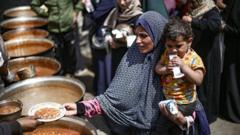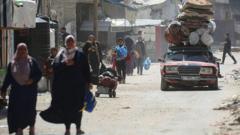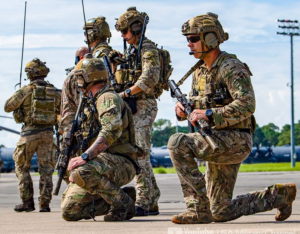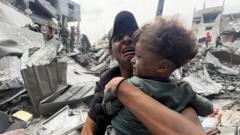As the Israeli military campaign continues in Gaza, the head of the International Committee of the Red Cross describes the situation as "hell on earth." With over 1,500 deaths since hostilities resumed and mass displacements, UN officials warn that actions by Israel threaten the existence of Palestinians in the region. Both international humanitarian law and the Geneva Conventions are cited in addressing the urgent needs of civilians amidst the ongoing violence.
UN Officials Voice Alarming Concerns Over Humanitarian Crisis in Gaza
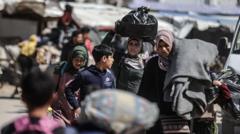
UN Officials Voice Alarming Concerns Over Humanitarian Crisis in Gaza
Leading figures from the United Nations and Red Cross highlight severe humanitarian conditions in Gaza as conflict escalates.
In a stark declaration, Mirjana Spoljaric, the head of the International Committee of the Red Cross (ICRC), described Gaza as "hell on earth," as Israeli military operations persist and the humanitarian crisis deepens. Spoljaric's comments come after reports indicate that over 1,500 individuals have been killed and nearly 400,000 displaced since hostilities resurfaced on March 18, following a brutal attack by Hamas on October 7, 2023.
The UN's human rights office has also raised alarms about the Palestinian population’s viability, suggesting that Israeli tactics—coupled with a complete blockade restricting food and medical aid—are creating conditions that could lead to an existential crisis for Palestinians. As the ICRC, which oversees adherence to the Geneva Conventions, makes these statements, it is usually reserved for confidential discussions, indicating the severity of the situation.
The Israeli Defense Forces (IDF) maintain that their actions comply with international law, contending that military measures are necessary to dismantle Hamas, which they accuse of using civilians as shields. However, reports indicate that the results of these military operations uniquely affect women and children, pointing to potential war crimes under international law, as expressed by Spoljaric.
The UN also echoed Strijevic's call for adherence to the Geneva Conventions, which obligate occupying powers to ensure the welfare of civilians. The conventions stipulate necessary protections including securing food, medicine, and health care access for those in conflict zones. As global scrutiny intensifies, Spoljaric underscored that no party to a conflict is exempt from obligations to avoid genocide and war crimes.
Highlighting the need to uphold humanitarian standards, Spoljaric stated that civilians are enduring grave hardships, as successive airstrikes force communities into displacement repeatedly, leaving them with destroyed homes and scarce resources. Just last week, the UN's Ravina Shamdasani appealed to the international community, emphasizing that continued bombardment is pushing Gaza closer to a "killing field."
International reactions have varied, with Israel accusing the UN of bias while maintaining that its military objectives are targeted against Hamas. Israeli officials argue that resources remain available for civilians despite the ongoing bombardment.
Both the UN secretary general and several heads of UN agencies recently urged global actors to intervene to alleviate Gaza's suffering, stressing the necessity of compliance with international humanitarian laws. Past military strategies have resulted in a significant toll on civilian lives and infrastructure.
Spoljaric’s warning about a rising sense of "dehumanization" throughout warfare implies the potential long-term repercussions of neglecting international norms. She asserts the importance of maintaining military conduct standards, arguing that the precedent set today matters for future peace efforts, as both soldiers and civilians will remember whether their adversaries respected humanitarian laws during conflict.
As the Israeli military seeks to dismantle Hamas, skepticism remains about the implications for Palestinian civilians. With thousands dead and conditions deteriorating further each day, the call for renewed ceasefires and protection under international law reflects an urgent necessity amidst ongoing violence.
The UN's human rights office has also raised alarms about the Palestinian population’s viability, suggesting that Israeli tactics—coupled with a complete blockade restricting food and medical aid—are creating conditions that could lead to an existential crisis for Palestinians. As the ICRC, which oversees adherence to the Geneva Conventions, makes these statements, it is usually reserved for confidential discussions, indicating the severity of the situation.
The Israeli Defense Forces (IDF) maintain that their actions comply with international law, contending that military measures are necessary to dismantle Hamas, which they accuse of using civilians as shields. However, reports indicate that the results of these military operations uniquely affect women and children, pointing to potential war crimes under international law, as expressed by Spoljaric.
The UN also echoed Strijevic's call for adherence to the Geneva Conventions, which obligate occupying powers to ensure the welfare of civilians. The conventions stipulate necessary protections including securing food, medicine, and health care access for those in conflict zones. As global scrutiny intensifies, Spoljaric underscored that no party to a conflict is exempt from obligations to avoid genocide and war crimes.
Highlighting the need to uphold humanitarian standards, Spoljaric stated that civilians are enduring grave hardships, as successive airstrikes force communities into displacement repeatedly, leaving them with destroyed homes and scarce resources. Just last week, the UN's Ravina Shamdasani appealed to the international community, emphasizing that continued bombardment is pushing Gaza closer to a "killing field."
International reactions have varied, with Israel accusing the UN of bias while maintaining that its military objectives are targeted against Hamas. Israeli officials argue that resources remain available for civilians despite the ongoing bombardment.
Both the UN secretary general and several heads of UN agencies recently urged global actors to intervene to alleviate Gaza's suffering, stressing the necessity of compliance with international humanitarian laws. Past military strategies have resulted in a significant toll on civilian lives and infrastructure.
Spoljaric’s warning about a rising sense of "dehumanization" throughout warfare implies the potential long-term repercussions of neglecting international norms. She asserts the importance of maintaining military conduct standards, arguing that the precedent set today matters for future peace efforts, as both soldiers and civilians will remember whether their adversaries respected humanitarian laws during conflict.
As the Israeli military seeks to dismantle Hamas, skepticism remains about the implications for Palestinian civilians. With thousands dead and conditions deteriorating further each day, the call for renewed ceasefires and protection under international law reflects an urgent necessity amidst ongoing violence.


